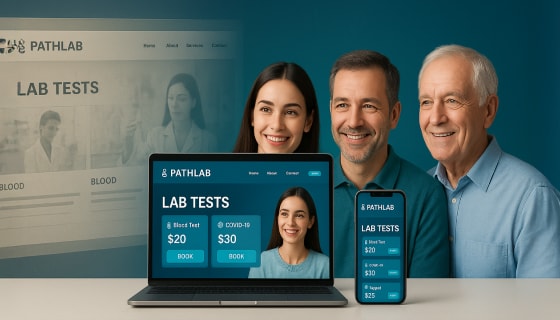When it comes to digital marketing for a healthcare practice, there’s no shortage of advice, but real inspiration comes from real results. What truly matters is not lofty theories or one-size-fits-all tactics but strategies that have already helped hospitals and clinics grow, attract new patients, and thrive in competitive regions.
This blog isn’t about abstract marketing theories or generic strategies. It’s about what worked for real clinics, with real challenges and measurable outcomes. Stay with us till the end of the blog to read about the insights that would help you to understand what’s working and how you can replicate the same growth for your practice.
So, if you’ve been wondering whether digital marketing is worth it for healthcare, let these stories show you the answer.
Case Study 1: How a Bariatric Clinic Doubled Inquiries with Smarter Marketing
NObesity, a renowned bariatric clinic specializing in weight loss surgery, noticed a gap between its offline reputation and online presence. It became clear that having a great medical team alone wasn’t enough to stand out in today’s digital landscape. Despite boasting exceptional clinical outcomes and a clear mission to combat obesity, their digital performance wasn’t reflecting their expertise.
The Challenges They Faced
- Weak visibility on Google for high-intent local keywords.
- Slow website performance and disorganized content flow.
- Low engagement across Facebook and Instagram.
- Widespread misconceptions about bariatric surgery weren’t being addressed.
- Inconsistent branding across platforms.
- Lack of reviews, which hurts credibility.
- Poor lead-to-conversion ratio from their website visitors.
Put simply, they were invisible to the very patients they were seeking to help and uninspiring to those who did find them.
The Strategy That Worked
ZealousWeb partnered with NObesity to execute a complete digital marketing for healthcare transformation, prioritizing visibility, trust, and patient education.
Here’s what we did:
- Implemented robust Local and technical SEO strategies to help the clinic rank for marketing for healthcare keywords patients use, like “weight loss surgery near me” and “bariatric clinic with EMI options.”
- Created myth-busting blog content to address concerns about surgery safety and outcomes with content that was clear, evidence-based, and empathetic.
- Rebuilt their website with a primary focus on performance, lead capture, and clarity, ensuring patients could navigate easily and take action.
- Optimized their Google Business Profile and third-party clinic listings to increase local discovery.
- Launched emotional and educational Facebook & Instagram campaigns highlighting real patient success stories and support.
- Rolled out a 360° lead generation system, combining SEO, PPC, and high-trust content.
The Results They Achieved
The clinic experienced remarkable results without having to increase physical infrastructure or staff:
- Organic traffic increased by 2.78%, while referral traffic surged by 19.11%.
- Facebook page likes increased by 4.68%, and Instagram visits rose by over 205%.
- The Domain Rating (DR) improved from 6 to 29 due to the consistent quality of content and positive reviews.
- Lead inquiries nearly doubled, driven by an improved reputation and higher discoverability.
This transformation restored patient trust and increased awareness of bariatric procedures. While NObesity’s success stemmed from improving organic visibility and content-driven trust, our next story highlights how a multi-specialty hospital utilized local SEO and paid advertising to quickly convert online searches into real-world appointments.
Case Study 2: How a Multi-Specialty Hospital Beat the Competition Online
In the crowded healthcare landscape, Hill View Hospital, a well-established multi-specialty hospital, found itself outpaced, not in care quality, but in digital visibility. Despite offering 24/7 emergency care, specialized departments, and experienced medical teams, online search results favored newer competitors with stronger digital strategies. The leadership team recognized that their offline excellence needed to be matched online, or they’d continue to lose patient traffic to hospitals with less experience but better online visibility.
The Challenges They Faced
- Low keyword rankings, even for service-specific terms.
- Unoptimized Google Business Profile and inconsistent reviews.
- Limited SEO focus, missing broader search intent.
- Weak backlink profile, limiting domain authority.
- Poor website engagement, with low online appointment conversions.
- The lack of ROAS tracking made ad performance difficult to measure.
Though Hill View Hospital excelled in patient care, its online presence was underperforming, resulting in lost opportunities.
The Strategy That Worked
ZealousWeb implemented a comprehensive digital marketing strategy that combined local SEO with targeted paid ads.
Here’s how we turned things around:
- Revamped SEO strategy to target high-intent local keywords like “multi-specialty hospital near me” and “24/7 emergency services,” boosting marketing for healthcare efforts and improving local search visibility.
- Improved website speed and mobile responsiveness for a better user experience.
- Built a local authority by acquiring backlinks from trusted health portals and directories, enhancing the hospital’s healthcare marketing strategies.
- Launched Meta Ads targeting high-demand services such as orthopedics and pediatrics.
- Utilized geo-targeting and local content to attract nearby patients and build stronger connections.
The Results They Achieved
The hospital saw immediate results, including:
- Top 3 Google rankings for nearly all targeted keywords.
- 22.67% increase in organic traffic, with social media traffic rising by 223.33%.
- Increased patient acquisition via the website and social channels.
- Stronger local brand recognition, including among referral partners.
These changes not only increased patient appointments but also enhanced Hill View Hospital’s reputation and authority in its local market. This success story highlights the effectiveness of combining local SEO and targeted ads to boost visibility and drive patient acquisition.
With these two as prime examples, we can see how thoughtful, patient-centered digital strategies can transform healthcare practices. However, behind these outcomes are key marketing strategies that, when consistently applied, can help any practice thrive. In the next section, we’ll explore the key marketing strategies that have delivered tangible results for healthcare practices so you can begin applying them to your journey toward growth.
Key Marketing Strategies That Delivered Results
The healthcare industry is evolving rapidly, and so is the way patients find and engage with practices. Today’s successful healthcare practices are those that embrace change, invest in digital tools, and focus on what truly matters to patients: visibility, trust, and accessibility.
To help your practice thrive in this digital-first world, here are the key marketing strategies that have consistently delivered results for healthcare providers.
Website Modernization
Your website is often the first impression potential patients will have of your practice, and first impressions matter. It involves redesigning your site for speed, mobile optimization, and user experience (UX). A modern website should not only be aesthetically pleasing but also intuitive, with quick load times and a seamless experience across devices. For example, you can integrate features like online booking systems, live chat, patient education portals, and SEO-friendly content that helps patients find answers before they even call.
This is a crucial aspect of any digital marketing strategy for healthcare, ensuring your online presence is optimized for patient engagement.
Local SEO
When patients search for healthcare providers online, they’re often looking for someone nearby. Local SEO helps your practice appear in those crucial local search results.
This includes optimizing your Google Business Profile, utilizing location-based keywords (such as “orthopedic doctor near me”), and ensuring that your practice’s details are consistent across all online platforms.
Additionally, encourage patient reviews and manage your online reputation, as positive feedback can significantly enhance your credibility and visibility.
Paid Ads (Google, Meta)
While SEO drives long-term growth, paid ads offer a quick and targeted boost to your practice’s visibility. By using high-intent keywords and localizing your ads, you can ensure that your practice is seen by those who are ready to take action. Ads can promote services, drive traffic, and gather patient contact info for follow-ups, offering a high return on investment.
To learn more about optimizing Google and Facebook ads for healthcare, check out our guide on marketing for healthcare ads.
Content-Driven Trust-Building
In healthcare, trust is everything. Patients need to feel confident in their decision to choose your practice for their care. By creating helpful, informative content that addresses patient concerns, educates about treatments, and showcases success stories, you position your practice as a reliable resource in the field.
Start by creating blog posts, FAQs, patient testimonials, and video content that explains standard procedures. Additionally, content can be tailored to address specific patient pain points, like “Is surgery safe for seniors?” or “What to expect during your first visit.” Consistent, valuable content not only educates your audience but also enhances your search engine optimization (SEO) efforts.
By incorporating these strategies, you’ll be well on your way to improving your practice’s online presence and patient engagement. Now, let’s explore the common traits shared by clinics that have successfully navigated the digital space and consistently seen growth.
Common Traits of Clinics That Succeeded Digitally
While every healthcare practice is unique, those who excel digitally share several key traits that contribute to their ongoing success. These traits are not just about gaining visibility—they are about fostering trust, loyalty, and engagement with patients, which ultimately leads to long-term growth. Let’s dive deeper into the habits and healthcare marketing strategies these practices employ.
Consistency
Successful clinics maintain consistency across all their digital platforms, ensuring that their messaging, visual identity, and communication are aligned and cohesive. When your online presence reflects the same professional image as your physical practice, it reassures patients that they’re in capable hands and creates a unified experience from the moment they find you online.
How to Put This into Practice:
Make sure your brand guidelines are consistent across all touchpoints. Regularly update your content—whether it’s social media posts, blogs, or patient reviews. Schedule posts and stick to a clear messaging framework that reflects your values.
Clarity
A common trait of successful clinics is their ability to communicate with clarity. Patients are looking for information that is easy to find, understand, and act upon. Clarity eliminates confusion and builds confidence. When patients can easily navigate your website or social media profiles, it shows that you respect their time and make it easy for them to choose you.
How to Put This into Practice:
Simplify your website’s layout so that visitors can quickly find what they need—whether it’s service descriptions, contact information, or online booking. Use precise language that patients can easily understand, particularly when discussing services, pricing, and procedures. Organize information logically so that new visitors don’t have to hunt for answers.
Patient-Centric Focus
The most successful clinics are patient-centric, placing the needs of their patients at the heart of every digital interaction. These clinics recognize that patient care should be consistent throughout every online interaction a patient has with them. When you focus on the patient’s needs, you not only build trust but also create a sense of loyalty.
How to Put This into Practice:
Create educational content that addresses common patient concerns. Offer personalized online services, such as easy appointment scheduling and live chat support. Follow up with patients post-treatment, whether through email, a survey, or a personalized message, to demonstrate your care and concern for their experience.
Adaptability and Agility
Digital success is not a one-time achievement but an ongoing process that requires continual adaptation to changing technology and patient expectations. Successful clinics are agile in their approach—they consistently analyze performance metrics, stay current with the latest digital trends, and adjust their strategies to maintain a competitive edge.
How to Put This into Practice:
Monitor analytics regularly to understand what’s working and what isn’t. Test new tools or healthcare marketing strategies—like a different type of paid ad campaign or content format—and see what resonates with your audience. Stay informed on SEO best practices and social media trends to ensure you’re using the most effective tactics.
While the traits of successful clinics offer valuable insights, many practices still face obstacles that hinder their full realization of digital marketing for healthcare potential. In the next section, we’ll explore the common pitfalls that clinics often miss and how to avoid them on your journey toward digital success.
What Clinics That Struggle Usually Miss
Despite numerous success stories, many healthcare practices continue to struggle with establishing a strong digital marketing strategy. Often, these struggles stem from missing key aspects of their online strategy. Let’s take a look at what they often miss and how you can steer clear of these pitfalls.
Neglecting SEO
One of the biggest mistakes healthcare practices make is neglecting search engine optimization (SEO). In the rush to launch paid ad campaigns or redesign websites, many overlook the importance of organic search visibility. Without strong SEO, your clinic risks remaining buried beneath competitors who have optimized their content and websites to appear in top search results.
Failing to Build an Online Reputation
A strong online reputation is essential for attracting new patients, yet many clinics fail to manage this crucial aspect. Negative reviews or a lack of reviews can significantly harm a clinic’s credibility. Patients often rely on online reviews to decide which healthcare provider to trust.
Ignoring the Power of Social Media
Social media is more than just a platform for posting updates — it’s an essential tool for building relationships with patients and attracting new ones. Many clinics still treat social media as an afterthought, posting sporadically and without a clear strategy in place.
Not Tracking and Analyzing Data
Many healthcare practices invest in marketing for healthcare but fail to track their efforts effectively. Without proper analytics and data tracking, it’s impossible to know what’s working and what’s not. This lack of insight can lead to wasted budgets and missed opportunities.
Identifying and addressing these gaps can be the turning point for your practice. Let’s now look at how you can apply these insights to your growth strategy.
| What They Miss | Why It Matters | What to Do Instead |
| Neglecting SEO | Without SEO, your clinic remains hidden in search results, losing out on organic traffic. | Invest in local SEO, optimize your Google Business Profile, and target location-based keywords. |
| Failing to Build an Online Reputation | Negative or few reviews reduce credibility and deter potential patients. | Actively encourage positive reviews and engage with all feedback. |
| Ignoring the Power of Social Media | Without a strategy, social media fails to connect and engage your audience. | Establish a consistent posting schedule, share valuable content, and engage with your followers. |
| Not Tracking and Analyzing Data | Without data tracking, you can’t measure success or optimize your efforts. | Set up Google Analytics, track conversion rates, and adjust strategies based on data insights. |
Now that we’ve explored the common pitfalls that hinder many healthcare marketing strategies, it’s time to turn those challenges into opportunities.
How You Can Apply These Lessons to Your Practice
By applying the insights from the previous sections, you can start seeing real, measurable results in your digital marketing for healthcare efforts. Here are some actionable steps you can take to apply the lessons learned from successful clinics:
Focus on SEO from the Start
To avoid the mistake of neglecting SEO, start with a solid foundation. Ensure your website is optimized for both local and organic search by targeting keywords that potential patients are searching for. Don’t forget to claim and optimize your Google Business Profile, as it’s often the first place patients will look when they find you online.
Build and Maintain an Online Reputation
To build trust and attract more patients, prioritize your online reputation. Make it a point to ask satisfied patients for reviews and respond to feedback. Regularly monitor your reviews on platforms like Google and Yelp to ensure you stay on top of your reputation. Use positive reviews as social proof across your website and social channels.
Be Consistent on Social Media
Create a social media strategy that aligns with your goals. Post valuable content consistently — whether it’s educational tips, patient stories, or updates about your services. Respond promptly to comments and messages, and engage with your followers to build a community of loyal patients. Social media ads can be a great way to target specific patient groups for services you want to promote.
Track and Analyze Your Efforts
Make data tracking a priority. Use tools like Google Analytics to monitor your website’s performance and ad tracking to measure the success of your paid campaigns. Regularly check which keywords, ads, and social media posts are driving the most traffic and engagement. Utilize this data to refine your strategies and optimize your campaigns over time.
By applying these healthcare marketing strategies, you can avoid the common mistakes that hinder other practices and establish a robust digital presence that works for you. As we move further, let’s look at quick wins you can replicate in the next 90 days to see immediate growth.
Quick Wins You Can Replicate in 90 Days
While long-term digital marketing strategies for healthcare are essential for sustained growth, focusing on quick wins that deliver measurable results within a short timeframe is crucial. Here’s a list of practical tasks you can implement in the next 90 days to jumpstart your digital success.
Optimize Your Google Business Profile
- Ensure your clinic’s name, address, and phone number (NAP) are accurate and consistent across all platforms.
- Add high-quality photos of your clinic, team, and services to make your profile more engaging and visually appealing.
- Respond to all patient reviews, both positive and negative, to show that you value feedback.
- Update your business hours and services to reflect current offerings.
Launch a Local SEO Campaign
- Research high-intent local keywords related to your services and location.
- Optimize your website pages by incorporating these keywords into titles, meta descriptions, and body content.
- Build local backlinks by partnering with local businesses, organizations, and directories.
- Create local content, such as blog posts about community events or health tips for your area.
Run a Targeted Facebook or Instagram Ad Campaign
- Choose a specific service (e.g., pediatrics, dental care) or offer (e.g., free consultation) to promote.
- Use geo-targeting to ensure your ads reach potential patients in your local area.
- Create a compelling ad with a strong call to action (e.g., “Book a consultation now!”).
- Test different ad formats, such as carousel, video, or story ads, to see which one performs best.
Create a Simple Lead Magnet
- Create informative content like an e-book, checklist, or guide on a popular topic (e.g., “Top 10 Tips for Healthy Living” or “What to Expect During Your First Visit”).
- Promote the lead magnet on your website and social media channels, offering it in exchange for a visitor’s contact information, such as their email address and phone number.
- Follow up with a nurturing email sequence to convert leads into appointments.
Start Blogging and Optimize Your Content
- Start with a blog post that answers common questions or concerns that patients have (e.g., “How to Choose the Right Pediatrician” or “What to Know About Preventive Care”).
- Use long-tail keywords that target specific topics your patients search for.
- Share your blog posts on social media and encourage patients to share them as well.
These steps are manageable and impactful, setting a strong foundation for future long-term healthcare marketing strategies.
Closing Thoughts
What if the next patient who walks through your door finds you because of an innovative, simple digital marketing strategy? The truth is, your practice’s growth story can start today with the proper steps and a little help from the experts.
ZealousWeb offers a complete suite of digital marketing for healthcare organizations, all under one roof. Whether it’s SEO, PPC, social media marketing, or reputation management, we’ve got you covered.
Get in touch with us today, and let’s turn your digital marketing into a patient magnet.













